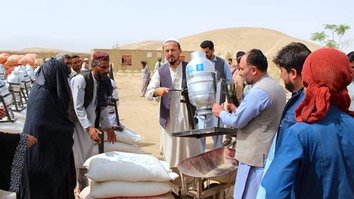KUNDUZ -- The United Nations (UN) has provided improved free wheat seeds and fertilisers to thousands of Afghan farmers in Kunduz province facing dire economic conditions.
The project, funded by the UN Office for the Co-ordination of Humanitarian Affairs (OCHA), was implemented January 7-14 in close collaboration with the Agency for Technical Co-operation and Development (ACTED), Hand in Hand Afghanistan Organisation (HIHAO) and the Food and Agriculture Organisation (FAO).
"The distribution of improved seeds and fertilisers will help farmers enhance resilience against future shocks and contribute to higher farm yields," said Mohammad Eamal Tahir, ACTED representative in Kunduz.
A survey by the Kunduz Department of Agriculture identified the farmers who were eligible for support, Tahir said, noting that they will continue to receive support in the future.
![A local farmer in Kunduz province carries a bag of improved wheat seeds provided by the United Nations at a compound of the Kunduz Agriculture Department on January 7. [Hasib Hasas/Salaam Times]](/cnmi_st/images/2022/01/19/33618-a__2_-585_329.jpg)
A local farmer in Kunduz province carries a bag of improved wheat seeds provided by the United Nations at a compound of the Kunduz Agriculture Department on January 7. [Hasib Hasas/Salaam Times]
The project provided as many as 4,000 farmers in Kunduz's capital, as well as in Aliabad, Khanabad, Chahar Dara, Dasht-i-Archi, Imam Sahib and Qala-e-Zal districts, with improved and certified wheat seeds and fertilisers, said Mohammad Kazem Khaki, the head of HIHAO in Kunduz.
This will allow them to grow and harvest more in the coming solar year, he said.
Each farmer was provided with a 50kg bag of wheat and two bags of fertiliser free of charge, he said.
Bigger and better harvest
Most of the farmers would not have been able to afford such seeds and fertilisers this year.
Mohammad Azeem, 42, a farmer in Aliabad district, said the assistance was provided at a very critical time as cold weather sets in.
With the new seeds and fertilisers, many farmers are very hopeful their yields will increase in the coming season, he told Salaam Times.
"I received two bags of fertiliser and a bag of improved wheat seeds, and I am sure that I will have a good harvest next year," he said.
"There is a big difference between improved and ordinary wheat seeds," said Noor Agha Hassanzoy, 35, a farmer in Khanabad.
In one acre of farmland, farmers can harvest 840kg of wheat from improved seeds as compared to 560kg from normal seeds, according to Hassanzoy.
Hassanzoy said the more assistance the farmers receive, the better chances for improving their economic conditions and livelihood.
"Farmers are currently confronting enormous economic challenges. We cannot afford to buy fertiliser because a bag ... which used to sell for 1,500 AFN ($14), now costs 3,500 AFN ($33)," he said.
"We are so grateful for their distribution free of charge," he added.
Mohammad Saleem, 55, a farmer in Chahar Dara district, blamed the protracted conflict in Afghanistan for the deteriorating conditions of farms and the harvest season in general.
"Now that improved seeds and fertilisers have been distributed to us, we will be able to cultivate our land and make up for the damage we have suffered," he said.
Shortage of wheat
Many Kunduz residents say that due to recent political developments, the prices of wheat and wheat flour have drastically gone up, and many vulnerable households cannot afford to buy them.
Kunduz resident Mohammad Asif Hamidi, 38, said that many households who have lost their incomes are at risk of starvation.
"In previous years, the former government tried to maintain the prices of food items, especially wheat flour, so that people would not face commodity shortages. However, nobody cares about the poor households anymore," he said.
Unemployment on one hand and the rising prices of food items on the other have exacerbated people's problems during the winter months, he added.
Lutfullah Maihandost, 47, a resident of Kunduz, said that given its strategic location and history, Kunduz is known as "the hive of the country".
"For several years, wheat was exported from this province to the rest of the country. However, people are now facing acute wheat shortages even in Kunduz itself," he said.








The United Nations is also making nonsense. It is ok that the distribution of fertilized seeds will be helpful for the future; however, Afghanistan is a country where the farmers themselves have fertilized seeds that give good harvests. The United Nations may better do fundamental works that can heal the pains of the Afghan nation. They may better implement public welfare projects that can give endless benefits to the people.
Reply1 Comment